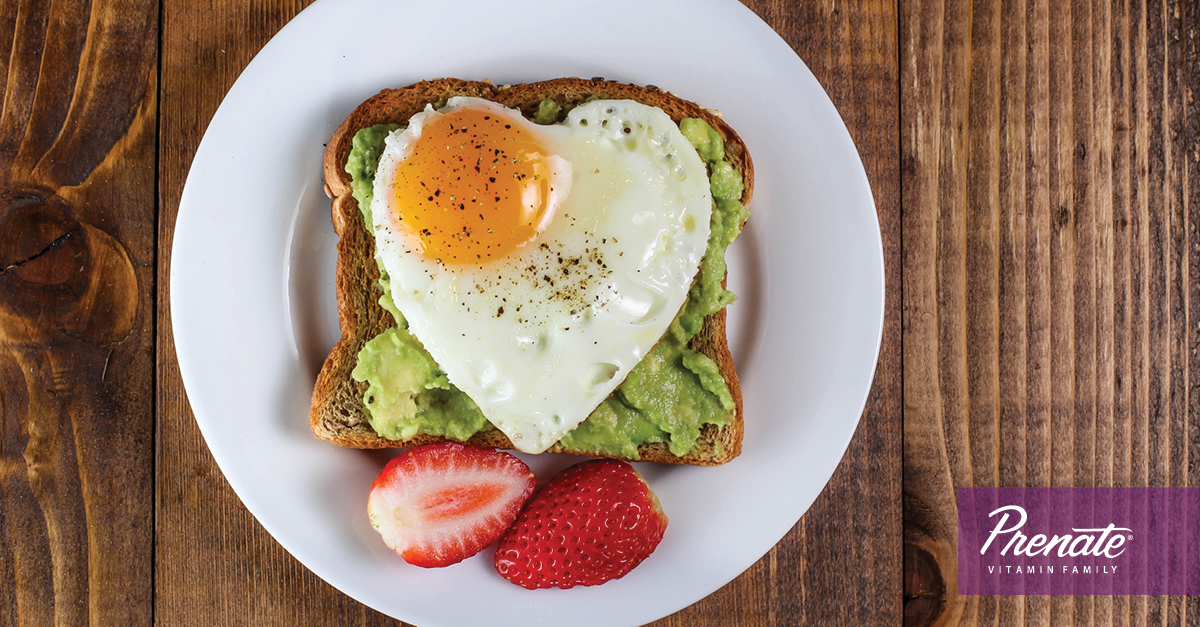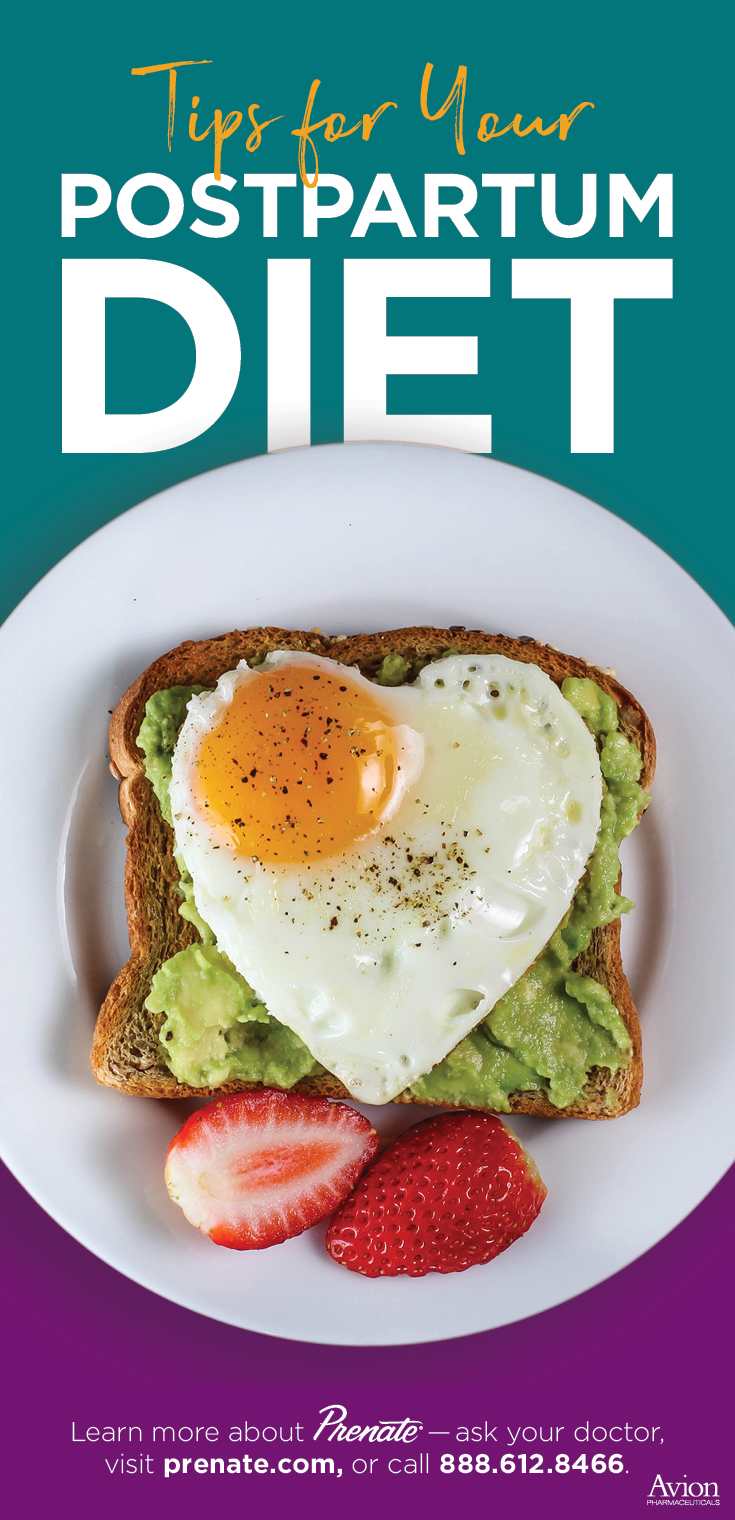Tips for Your Postpartum Diet
March 29, 2020
After giving birth, new moms are often cautious about what they eat. Nursing moms are especially concerned with the types of foods and beverages they consume, since they don’t want to transmit unhealthy substances to their newborns through breastmilk. However, making major diet changes right after having a baby can be unpleasant and sometimes do more harm than good. Moms in the postpartum stage require more calories than usual, especially when breastfeeding.1 The last thing moms should do is throw off natural bodily processes by depriving themselves of needed nutrients. Instead, new mothers should consider the following dietary tips and discuss their concerns with their health care professional.
Diversify Your Diet
Health care professionals generally do not recommend eliminating specific types of food, unless you have diet-related medical issues. The most important part of maintaining a healthy postpartum diet is to make sure you’re eating a variety of health foods.1 Try to eat a balanced diet of proteins, grains, fruits and veggies instead of following a restrictive diet that eliminates specific choices.
Consume with Caution
Although you likely won’t have to eliminate specific foods from your postpartum diet, there are some foods and beverages that should be consumed in moderation:
- Seafood
- Caffeine
- Alcohol
Since nearly all types of seafood contains small amounts of mercury, postpartum and breastfeeding mothers should follow the guidelines of the U.S. Food and Drug Administration. The guidelines include eating a variety of fish; if you eat fresh-caught fish, check local fish advisories; and limit your servings based on their “good” and “best” choices chart (available online.)2
Caffeine, which is an addictive stimulant, may contribute to fussiness, poor sleeping patterns and jitteriness in nursing infants. However, the U.S. Centers for Disease Control and Prevention states that caffeine transmitted through breastmilk usually does not cause adverse effects in infants when the mother consumes low to moderate amounts (about two to three cups of coffee daily.)1
As for alcohol, many postpartum mothers look forward to having their first glass after abstaining for nine months. Just be cautious when you do imbibe. Your tolerance is likely to have dropped significantly, so your body may metabolize it differently now.
You also should keep the timing of feedings in mind if you are breastfeeding your baby and want to indulge in the occasional drink. Although having an alcoholic drink once or twice a week is usually fine, its best to refrain from consuming alcohol when nursing. A good rule of thumb is once you no longer feel the effects of alcohol, it’s safe to start nursing your baby.5
Stay Hydrated
There’s a reason it’s called labor. Your body will work extremely hard during the birth process, which means you’re going to sweat … a lot! You’ll likely be hooked up to an IV to get fluids while you’re in the hospital, but you should make sure you’re drinking more fluids once you go home. Water is always a good choice, but you can also give your body extra fluid by consuming things such as soups and broths, cucumbers, watermelon, grapefruit, cottage cheese and plain yogurt.3
Boost Your Iron Intake
Some amount of blood loss is normal during childbirth. So paying attention to your body’s iron needs postpartum can help you feel stronger and healthier. Iron is a nutrient that is essential for blood production, so consuming iron-rich foods after having a baby can be beneficial. While you might not feel up to a T-bone steak after giving birth, you could try lighter, iron-rich snacks to help ease you back into your appetite. Beef jerky, pumpkin seeds and even dark chocolate are good sources of iron.4
Incorporate a Vitamin Postpartum
Healing from labor and delivery and recovering from pregnancy put extra demands on your body. Breastfeeding requires even more energy and calories. Support your health and your baby’s development by talking with your doctor about ensuring you get the proper nutrients through diet and from supplements.
The nutrition required in the third trimester is similar to postpartum for mothers who breastfeed. You still need 1,000 mg of folate, extra vitamin D, and calcium.6 New moms may also want to supplement with biotin to support healthy hair and nail growth.7
The Prenate® Family Line of Prenatal Vitamins offers a wide selection of nutritional supplements that are specially formulated with the needs of new mothers in mind. Prenate® Restore is a prenatal vitamin with probiotics as well as folate, vitamin D and calcium. It is designed for postpartum and breastfeeding but also is appropriate to take during pregnancy. Talk to your doctor about choosing a supplement that’s right for you and your baby during this important time. From prenatal nutrition to postpartum and nursing, there’s likely a Prenate® vitamin supplement that will work for you.
You Are About To Leave This Website
By clicking continue, this link will take you to a website to which Alora Pharmaceuticals Policies & Terms of Use do not apply. Alora and its subsidiaries do not control the content or accuracy of third-party websites and assume no responsibility for their use.














